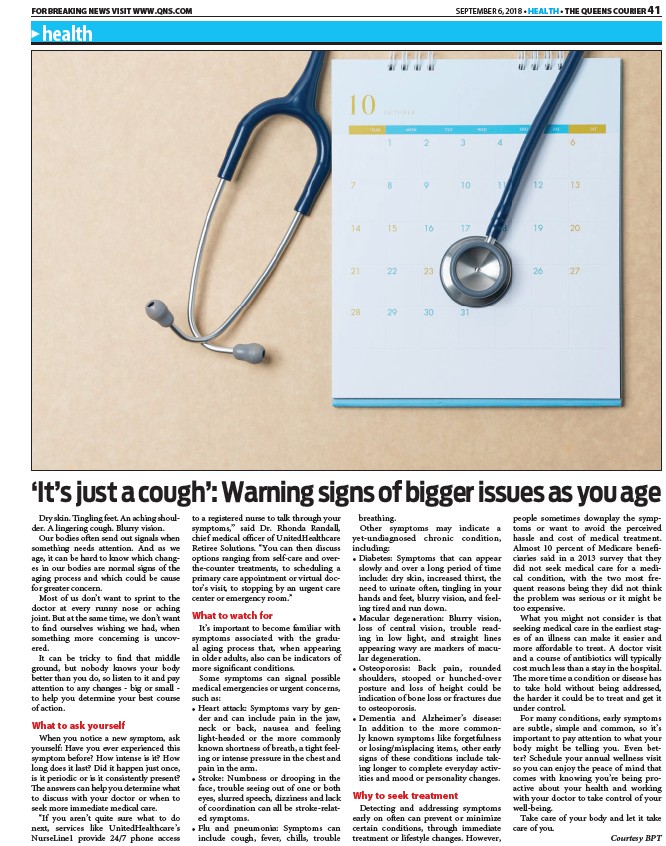
FOR BREAKING NEWS VISIT WWW.QNS.COM SEPTEMBER 6, 2018 • HEALTH • THE QUEENS COURIER 41
health
‘It’s just a cough’: Warning signs of bigger issues as you age
Dry skin. Tingling feet. An aching shoulder.
A lingering cough. Blurry vision.
Our bodies oft en send out signals when
something needs attention. And as we
age, it can be hard to know which changes
in our bodies are normal signs of the
aging process and which could be cause
for greater concern.
Most of us don’t want to sprint to the
doctor at every runny nose or aching
joint. But at the same time, we don’t want
to fi nd ourselves wishing we had, when
something more concerning is uncovered.
It can be tricky to fi nd that middle
ground, but nobody knows your body
better than you do, so listen to it and pay
attention to any changes - big or small -
to help you determine your best course
of action.
What to ask yourself
When you notice a new symptom, ask
yourself: Have you ever experienced this
symptom before? How intense is it? How
long does it last? Did it happen just once,
is it periodic or is it consistently present?
Th e answers can help you determine what
to discuss with your doctor or when to
seek more immediate medical care.
“If you aren’t quite sure what to do
next, services like UnitedHealthcare’s
NurseLine1 provide 24/7 phone access
to a registered nurse to talk through your
symptoms,” said Dr. Rhonda Randall,
chief medical offi cer of UnitedHealthcare
Retiree Solutions. “You can then discuss
options ranging from self-care and overthe
counter treatments, to scheduling a
primary care appointment or virtual doctor’s
visit, to stopping by an urgent care
center or emergency room.”
What to watch for
It’s important to become familiar with
symptoms associated with the gradual
aging process that, when appearing
in older adults, also can be indicators of
more signifi cant conditions.
Some symptoms can signal possible
medical emergencies or urgent concerns,
such as:
• Heart attack: Symptoms vary by gender
and can include pain in the jaw,
neck or back, nausea and feeling
light-headed or the more commonly
known shortness of breath, a tight feeling
or intense pressure in the chest and
pain in the arm.
• Stroke: Numbness or drooping in the
face, trouble seeing out of one or both
eyes, slurred speech, dizziness and lack
of coordination can all be stroke-related
symptoms.
• Flu and pneumonia: Symptoms can
include cough, fever, chills, trouble
breathing.
Other symptoms may indicate a
yet-undiagnosed chronic condition,
including:
• Diabetes: Symptoms that can appear
slowly and over a long period of time
include: dry skin, increased thirst, the
need to urinate oft en, tingling in your
hands and feet, blurry vision, and feeling
tired and run down.
• Macular degeneration: Blurry vision,
loss of central vision, trouble reading
in low light, and straight lines
appearing wavy are markers of macular
degeneration.
• Osteoporosis: Back pain, rounded
shoulders, stooped or hunched-over
posture and loss of height could be
indication of bone loss or fractures due
to osteoporosis.
• Dementia and Alzheimer’s disease:
In addition to the more commonly
known symptoms like forgetfulness
or losing/misplacing items, other early
signs of these conditions include taking
longer to complete everyday activities
and mood or personality changes.
Why to seek treatment
Detecting and addressing symptoms
early on oft en can prevent or minimize
certain conditions, through immediate
treatment or lifestyle changes. However,
people sometimes downplay the symptoms
or want to avoid the perceived
hassle and cost of medical treatment.
Almost 10 percent of Medicare benefi -
ciaries said in a 2013 survey that they
did not seek medical care for a medical
condition, with the two most frequent
reasons being they did not think
the problem was serious or it might be
too expensive.
What you might not consider is that
seeking medical care in the earliest stages
of an illness can make it easier and
more aff ordable to treat. A doctor visit
and a course of antibiotics will typically
cost much less than a stay in the hospital.
Th e more time a condition or disease has
to take hold without being addressed,
the harder it could be to treat and get it
under control.
For many conditions, early symptoms
are subtle, simple and common, so it’s
important to pay attention to what your
body might be telling you. Even better?
Schedule your annual wellness visit
so you can enjoy the peace of mind that
comes with knowing you’re being proactive
about your health and working
with your doctor to take control of your
well-being.
Take care of your body and let it take
care of you.
Courtesy BPT